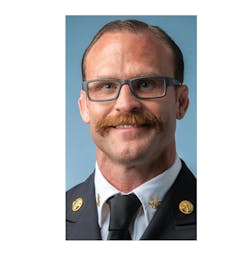With the conclusion of 2024 and looking ahead to 2025, it’s a new year to be excited about. New possibilities. New beginnings. However, as we all make that move, I want to highlight a different topic in this column: grief. How does one deal with grief? Are there right ways? Are there wrong ways? How do leaders deal with grief when they are supposed to be strong?
I’m not an expert on grief, so I won’t try to give you answers that I don’t have, but I will share with you that 2024 was one of the most difficult years of my life personally and professionally, with profound losses and tragedies on both ends that many of you never will hear about or see. I phrase it specifically that way because I’m not unique, and most of you are dealing with grief in a similar fashion. Many of you are confronting issues that are life-altering and very difficult to wrap your mind around. I write this column with the hope that it helps you to make progress from that grief that seems insurmountable at times.
Navigating grief
To me, grief feels like this dark cloud over my mind and my heart that just deeply hurts. There are triggers to this grief: sights, sounds, smells, streets, songs, etc. For many folks in our profession, there are triggers literally everywhere. How does one navigate those triggers as a person and then, on top of that, as an emergency responder?
I ask a lot of questions above, because I’m trying to get you to think. We continue to let these issues fester in our mind and our life without reaching out for help. Of course, this applies to leaders as well as to those who they serve.
I was trained at a military college, The Citadel, to always be stoic and tough. As I’ve aged, that stoicism has remained, but in times of quiet and darkness, it wanes.
During 2024, I focused on a few areas during my grief that have helped me, and they might help you as well.
Reach out
Have a circle of friends who you always can turn to 24 hours a day. Find someone who you can cry with on the phone if you need to. I know that you’re all “too tough to cry,” but, please, give yourself some grace. I was notified recently of some very sad news about a friend, and I just sobbed on the phone with my fire chief—literally sobbed—and couldn’t put two words together. I was sitting in an airport and was oblivious to everyone else who was around me. All I could do was sit with the sad news. It was difficult.
Then there’s therapy. There are so many options for therapy today—in person, online, etc. Look at it this way: When you need to get into shape, you hire a personal trainer to do it correctly. It’s the same with the mind. You need someone who can guide you through the grief in an objective manner.
Rediscover yourself
Find time to do things that you enjoy. I recently started writing poems that have turned into rap songs about mental health, suicide, bullying, spousal support, veterans and a host of other meaningful topics. I perform these, but not because I can sing. I perform them because they’re an outlet, an escape, but also with the hope that it helps others who can’t find the words. Some will laugh at me and make fun of me, but I’ll take that if it helps one person find strength to live another day.
I’ve looked inside myself to find me again. I lost myself for a while in 2024 because of the grief that I was experiencing and that continued to build throughout the year, this on top of the other grief that I’ve struggled with daily for the nearly 18 years that passed since my department lost nine firefighters. There is a core group of us in my department who survived an insurmountable toll of grief and still are moving forward with our lives, some on the job, some off the job. We have been through so much, and I’m proud to see all of them standing tall at department events.
I challenged myself to participate in sports that I stopped competing in because I was so caught up in work and life. I reengaged and found that I’m at a point in my life when I can compete in mixed martial arts, boxing and bare-knuckle boxing with the right frame of mind. (When I was a professional mixed martial arts fighter in my younger years, I just didn’t get combat sports and the discipline that goes along with it.) You can’t forget about the things that make you you. I enjoy combat sports. They make me me.
As a leader
I’ve tried to give myself more grace and to give that to others as well. I genuinely care about the people I work with. I want them all to succeed in life and to find ways to endure their pain. Sometimes, that weighs heavily on me as a leader, because I don’t have all of the answers, and I find myself feeling helpless. However, I find that being upfront and direct about a situation is more appropriate and gathers more respect.
I realized that I have a dream: to work hard to make a reality for a generation of firefighters who were spoken about negatively because of my department losing nine firefighters on June 18, 2007. We lost so much institutional knowledge and just great people. I don’t want all of that new generation of firefighters to think that we can’t lead our department, because I know that we can. We just need a chance.
I remember why I wake up each day. For some reason, God put me here to help to lead the department that I’ve dedicated my life to. To talk about suicide, to discuss mental health, to help others who have spousal issues. To carry caskets, to fold flags. To show people the way for personal and professional growth, while also being vulnerable enough to realize that I don’t have all of the answers nor to pretend to. I am flawed, and I struggle, like many of you, every day with issues, but I keep getting up and taking it day by day, just as you must.
Learning
Although you’re reading this in January, I’m writing the column at 12:16 a.m. on the day of a dear friend’s funeral in December. I’m really hurting at the moment, but I know that the best thing that I can do is to continue to type on this computer to finish this piece, then go to bed. Then get up, put on my Honor Guard uniform and honor my friend, who was loved by so many. It’s going to hurt, but I’m learning that the hurt makes me grow and appreciate life and the short time that we have on this Earth with people who we love and care about.
About the Author

Dr. David Griffin
Dr. David Griffin is the assistant chief of administration in Charleston, SC. He was the operator of the first-due engine on June 18, 2007, when nine of his fellow firefighters perished. Griffin has come through the ranks in operations in every uniformed position, from firefighter to battalion chief and shift commander to his current position, during his 20-year career in Charleston. He has a bachelor's degree in education from The Citadel, a master's degree in executive fire service leadership, and a doctorate of education in organizational leadership and development. Griffin is the author of "In Honor of The Charleston 9: A Study of Change Following Tragedy," among three other books. He is an international speaker and instructor, a certified Chief Fire Officer and Chief Training Officer with The Center for Public Safety Excellence, an IFSAC/Pro Board-certified Fire Officer IV and a graduate of the Executive Fire Officer Program from the National Fire Academy. He is a graduate of Harvard University's Kennedy School of Executive Education program: Senior Executives in State and Local Government and of the Psychology of Leadership program at Cornell University's SC Johnson College of Business. Griffin is the owner of On A Mission, LLC, at drdavidgriffin.com.
